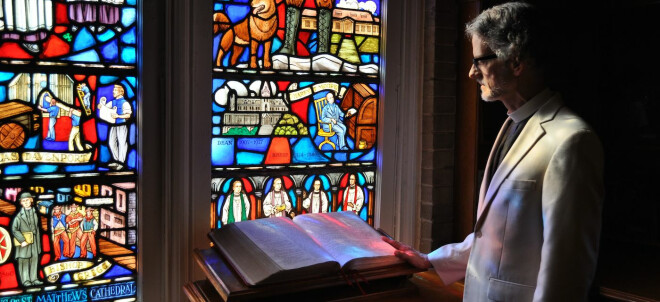Where Has He Gone?

But if she is sleeping in Jesus, where’s Jesus?
---
In chapter 14 of Saint John’s gospel, Jesus says he is going to the Father, and that he is going to prepare a place for his disciples/friends, and that he will return to take us there. Presumably, at the Ascension Jesus consummated this journey: ascending, he returned to his Father, and went to his Father as a complete human being, both body and soul.
But where is his Father?
---
This is hard. Sometimes I wish Jesus had told his disciples he was going to Polynesia. They wouldn’t have had the foggiest, but they could have written down that odd word “Polynesia,” and eventually someone would have figured out the way to get there.
Or he could have said he was going to Mars. We don’t yet know how to get there, but it’s mostly worked out, and soon we will.
Or he could have said he was going to Dallas. That would have been fun: Dallas didn’t even exist then. But we could all have been waiting for its creation, and once it was there, off we would run to find Jesus.
But no . . . he didn’t say he was going to a place, neither to a known place nor to one unknown, neither to a place on earth nor to a place elsewhere in the universe, nor yet to a place somewhere in the future. He said: I am going to the Father.
---
When God became man, the author of the story became a character in the story. Then at the end of this character’s life he left the story and returned to the author. But he did so without ceasing to be the character. So now, within the author’s being there is a fully human character.
Jesus is there, with the Father, which is to say he is in no place but is with the one who is the author of all places.
And that, it seems to me, is where we should think of the souls of the departed: they are in Jesus. Jesus is preparing a “place” for us with the Father—“there” in the Being of God. They are waiting, for they are there only in soul.
And when all the waiting is over, at the end of all things, there may we find ourselves, not only in soul, but (like Jesus) in soul and body together: human creatures dwelling in God’s very being.
---
By the way, the film “Stranger than Fiction” plays with the idea of a character and his author being in the same world together.
---
Out & about. Sunday, May 21, I am to speak at the adult forum at the Church of the Good Shepherd in Dallas, at 9:15 a.m.
On Ascension Day, Thursday, May 25, I am to preach at the 7 p.m. service in the Ascension Chapel of Church of the Incarnation, Dallas.


